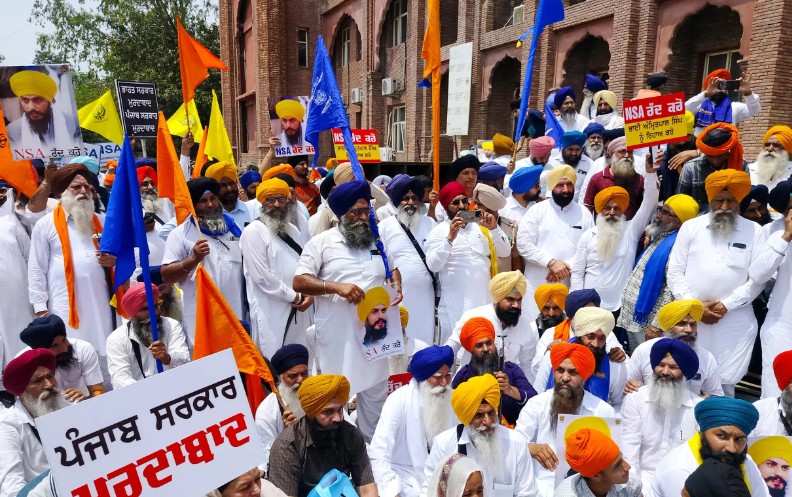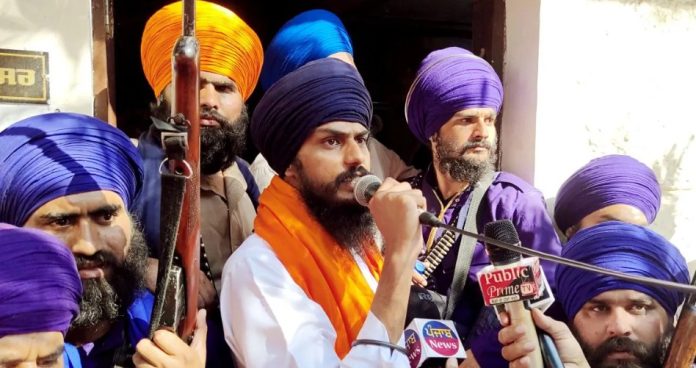A fresh wave of apprehension and widespread protest has engulfed Punjab following the state government’s decision to impose the stringent National Security Act (NSA) on radical Sikh preacher and newly elected Member of Parliament (MP), Amritpal Singh, for an unprecedented third consecutive time. This latest extension of his preventive detention, effective from April 23, 2025, has ignited a fierce debate over civil liberties, human rights, and the perceived overreach of state power, drawing sharp criticism from various Sikh organizations, legal experts, and political factions across the state.
Amritpal Singh, the self-styled chief of ‘Waris Punjab De,’ has been lodged in Assam’s Dibrugarh Central Jail since his dramatic arrest on April 23, 2023, following a month-long manhunt by Punjab Police. His initial detention, along with several of his associates, came under the NSA, a draconian law that allows for preventive detention for up to twelve months without formal charge or trial, on grounds of national security or maintenance of public order. The first imposition of the NSA was a direct consequence of the volatile events surrounding the Ajnala police station incident in February 2023, where Amritpal Singh and his armed supporters stormed the police station, clashing with law enforcement to secure the release of an aide. Authorities at the time cited concerns over his alleged secessionist rhetoric, attempts to incite disharmony, and potential to disrupt peace in the sensitive border state.
His detention was subsequently extended for a second year in April 2024, just ahead of the Lok Sabha elections, a move that stirred considerable controversy. Despite being incarcerated, Amritpal Singh contested the 2024 parliamentary elections as an independent candidate from the Khadoor Sahib constituency and achieved a resounding victory, securing a significant mandate from the electorate. This electoral success, attained while he remained behind bars, underscored his enduring influence and transformed him into a jailed MP, adding a unique dimension to his legal and political predicament.

The recent decision to extend his NSA detention for a third year, officially confirmed by the Punjab government in mid-April 2025, has been met with incredulity and outrage among his supporters and various Sikh bodies. His legal team, led by advocate Imaan Singh Khara, has vehemently slammed the extension, arguing that it is a “violation of human rights” and a cynical attempt by the government to “murder democracy.” They contend that the law does not permit such prolonged preventive detention without compelling fresh grounds, and that the continued incarceration of a sitting Member of Parliament, thereby preventing him from fulfilling his constitutional duties and representing his constituents in Parliament, is an affront to democratic principles.
Adding to the complexity, while Amritpal Singh’s NSA detention has been extended, several of his close aides, who were also held under the NSA in Dibrugarh Jail, have either been released or transferred back to Punjab to face trials in other criminal cases, primarily related to the Ajnala incident. This differential treatment, with Amritpal Singh singled out for continued NSA detention, has further fueled the perception among his supporters that his incarceration is politically motivated and lacks sufficient legal justification, designed solely to neutralize his growing influence. Reports suggest that the government’s justification for the third extension includes alleged instances of him continuing to engage in “subversive and separatist activities” even from jail, and intelligence inputs claiming his continued potential to pose a threat to public order if released. However, these “fresh grounds” remain largely undisclosed to the public and are being legally challenged by his counsel.
The protests against this third NSA imposition have manifested in various forms across Punjab. Amritpal Singh’s father, Tarsem Singh, has been particularly vocal, accusing the government of wielding “black laws” against minorities and stifling dissent. Sikh organizations, youth groups, and villagers, especially from the Khadoor Sahib constituency, have organized peaceful sit-ins, rallies, and prayer meetings. These demonstrations, though largely non-violent, reflect a deep-seated resentment against what they perceive as an oppressive use of a preventive detention law. The sentiment on the ground ranges from anger over the prolonged detention of a leader they elected, to concerns about the erosion of fundamental rights and the selective application of legal provisions. Social media campaigns have also intensified, disseminating messages critical of the government’s action and calling for Amritpal Singh’s immediate release.
Legal experts and human rights advocates have long criticized the broad powers conferred by the National Security Act, often labeling it a “lawless law” due to its allowance for detention without charge or trial, and limited avenues for judicial review. They argue that while preventive detention laws are permissible under the Indian Constitution, their repeated and prolonged application, particularly when previous detention orders have expired, raises serious questions about due process and the spirit of justice. The absence of specific, transparent, and verifiable fresh grounds for repeated imposition of NSA, beyond vague security concerns, further compounds these worries, leading to accusations of a tool being used for political suppression rather than genuine threat prevention.
The political ramifications of this decision are significant for Punjab. The ruling Aam Aadmi Party (AAP) government in Punjab, which initially campaigned on promises of transparency and justice, finds itself in a precarious position. While it maintains that the decision is based on strong intelligence inputs and aims to preserve peace and order in the state, it faces accusations of succumbing to pressure from central agencies or employing heavy-handed tactics. The opposition parties, including traditional Akali factions and the Congress, have seized upon the issue, criticizing the government’s handling of the situation and expressing solidarity with the protesters, albeit with varying degrees of emphasis. The issue of Amritpal Singh’s detention, particularly given his electoral victory, has become a rallying point for certain segments of the Sikh community, potentially exacerbating existing tensions and creating a fertile ground for dissent and radicalization if not handled with extreme sensitivity and fairness.
Historically, Punjab has a complex relationship with preventive detention laws, having witnessed their widespread application during periods of insurgency and unrest. The memory of such measures, and their perceived misuse, often fuels public mistrust and resentment. The current scenario, with a leader elected by a popular mandate remaining incarcerated under the NSA, risks rekindling sentiments of alienation among certain sections of the populace.
As the protests continue and the legal battle unfolds, the case of Amritpal Singh’s unprecedented third NSA imposition stands as a critical test for India’s democratic principles and the delicate balance between national security imperatives and the fundamental rights of its citizens. The demands for his release, or at least for a transparent legal process, resonate not just within Punjab but also among human rights advocates nationwide, highlighting the imperative for the state to demonstrate that its actions, even in matters of national security, are unequivocally just, necessary, and within the bounds of the law.


